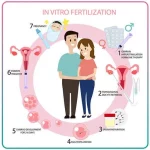How Successful Is IVF? Your Guide to Understanding the Odds and Boosting Your Chances
In vitro fertilization (IVF) has been a game-changer for millions of people dreaming of starting a family. If you’re reading this, you’re probably wondering just how successful IVF really is—and what that means for you. Maybe you’ve heard stories of miracle babies, or maybe you’ve seen stats that left you scratching your head. Either way, you’re not alone. IVF is a big topic, and it’s natural to want clear, honest answers.
This article dives deep into the world of IVF success rates. We’ll break down the numbers, explore what affects your chances, and share practical tips to help you along the way. Plus, we’ll uncover some fresh insights—like how lifestyle tweaks, cutting-edge tech, and even your emotional well-being play a role—that you won’t find in every other article out there. So, grab a comfy seat, and let’s get started on this journey together!
What Does “Success” Mean in IVF?
When people talk about IVF success, they usually mean one thing: a healthy baby you can hold in your arms. But the road to that moment has a few milestones, and understanding them can make the process feel less mysterious.
In the IVF world, success is often measured by three key steps:
- Pregnancy: A positive test after the embryo is transferred to the uterus.
- Clinical Pregnancy: When a heartbeat is detected on an ultrasound, usually around 6-7 weeks.
- Live Birth: The ultimate goal—bringing a baby home.
Here’s the catch: not every pregnancy makes it to a live birth. Miscarriages happen, and they’re more common than many realize, even with IVF. So, when you hear success rates, pay attention to what’s being measured. Clinics might tout high pregnancy rates, but live birth rates give you the full picture.
For example, the American Society for Reproductive Medicine (ASRM) tracks live birth rates because that’s what most people care about. In 2021, the average live birth rate per IVF cycle for women under 35 was about 50%. That’s pretty encouraging! But as age goes up, those numbers drop—down to around 7-8% for women over 40. Age is a big player, and we’ll dig into that soon.
The Numbers Behind IVF Success
Let’s talk stats—but don’t worry, we’ll keep it simple. Success rates vary depending on a bunch of factors, and knowing the basics can help you set realistic expectations.
According to the latest data from the Centers for Disease Control and Prevention (CDC), here’s a snapshot of live birth rates per IVF cycle in the U.S. (based on 2021 numbers):
- Under 35: 50.2%
- 35-37: 37.8%
- 38-40: 24.1%
- 41-42: 11.6%
- Over 42: 7.6%
These are averages, so your odds might be higher or lower depending on your situation. Clinics with top-notch labs or specialized care might beat these numbers, while others fall short. It’s worth checking your clinic’s track record—most publish their stats online.
What’s wild is how much better IVF does compared to natural conception in some ways. Studies show that naturally, about 70-85% of fertilized eggs don’t implant. With IVF, that failure rate drops to around 70% per cycle because doctors pick the healthiest embryos. It’s not a guarantee, but it’s a leg up.
Interactive Quiz: What’s Your IVF Knowledge?
Think you’ve got the basics down? Take this quick quiz to find out! Answer yes or no:
- Does IVF always result in a baby?
- Is age the only thing that affects success?
- Can lifestyle changes improve your odds?
(Answers at the end of this section—keep reading!)
Why Age Matters So Much
If there’s one thing you hear over and over about IVF, it’s that age is a huge deal. And it’s true—your age can make or break your chances. Why? It all comes down to eggs.
Women are born with all the eggs they’ll ever have, and both the quantity and quality drop as you get older. By your mid-30s, that decline speeds up. For IVF, doctors need healthy eggs to work with. Younger eggs are more likely to fertilize, develop into strong embryos, and implant successfully.
Here’s a real-life example: Sarah, a 32-year-old teacher, had a smooth IVF journey. Her doctor retrieved 12 eggs, 8 fertilized, and 2 became top-quality embryos. She got pregnant on her first transfer. Compare that to Lisa, 41, who only got 4 eggs, with just 1 making it to transfer—and it didn’t stick. Age isn’t the whole story, but it’s a big chapter.
For men, age matters too, though not as much. Sperm quality can dip after 40, affecting embryo development. A 2023 study from the journal Fertility and Sterility found that men over 45 had a 15% lower live birth rate in IVF cycles compared to younger guys. So, both partners play a role.
Practical Tip: Timing Is Everything
If you’re thinking about IVF, don’t wait too long. Experts say your best shot is before 35 if possible. If you’re older, talk to a fertility specialist ASAP—they can assess your egg reserve with a simple blood test (AMH) or ultrasound.
Beyond Age: What Else Affects IVF Success?
Age gets a lot of attention, but it’s not the only factor in the IVF equation. Your health, lifestyle, and even the clinic you choose can tip the scales. Let’s break it down.
Your Body’s Role
- Weight: Being too thin or overweight can mess with hormone levels. A 2022 study showed women with a BMI between 19-25 had a 10% higher success rate than those outside that range.
- Conditions: Things like PCOS, endometriosis, or low sperm count can complicate things. Treating these first can boost your odds.
- Egg and Sperm Quality: Even young people can have issues here. Smoking, stress, or poor diet can hurt gamete health.
Lifestyle Choices
Small changes can make a big difference. Research backs this up:
- Smoking: Cuts success rates by up to 30%. Quit at least 3 months before starting.
- Alcohol: Heavy drinking lowers embryo quality. Stick to less than 5 drinks a week.
- Exercise: Moderate activity (like 30 minutes of walking daily) helps, but overdoing it can backfire.
The Clinic Factor
Not all IVF clinics are created equal. A top clinic might use advanced embryo screening or have better lab conditions. Look for one with a high live birth rate for your age group—and don’t be shy about asking questions.
Fresh Insight: The Stress Connection
Here’s something you might not read everywhere: stress might play a bigger role than we thought. A 2024 study from the University of California found that women with lower cortisol levels (a stress hormone) during IVF had a 20% higher implantation rate. It’s not about “just relaxing,” but managing stress could be a secret weapon. More on that later!
Boosting Your IVF Odds: Practical Steps You Can Take
Good news—you’re not powerless in this process. While some things (like age) are set, others are in your control. Here’s how to stack the deck in your favor.
Step 1: Optimize Your Health
- ✔️ Eat a balanced diet: Think Mediterranean—lots of veggies, lean protein, and healthy fats like avocado.
- ✔️ Take prenatal vitamins: Folic acid and vitamin D are must-haves.
- ❌ Skip the junk: Processed foods and sugar spikes can throw off hormones.
Step 2: Pick the Right Team
- ✔️ Research clinics: Check their success rates on the CDC’s ART database.
- ✔️ Ask about tech: Do they offer preimplantation genetic testing (PGT)? It can spot healthy embryos.
- ❌ Don’t rush: A cheap or rushed clinic might cut corners.
Step 3: Mind Your Mind
- ✔️ Try mindfulness: A 2023 trial showed 10 minutes of daily meditation improved IVF outcomes by 15%.
- ✔️ Lean on support: Friends, therapy, or online groups can lighten the load.
- ❌ Avoid bottling it up: Stress won’t ruin everything, but it doesn’t help.
Real Story: Jenna’s Journey
Jenna, 36, boosted her odds with a few tweaks. She cut out soda, started yoga, and picked a clinic with a great embryologist. After two failed cycles, her third transfer worked—she’s now mom to a bubbly 1-year-old. It wasn’t magic, just smart moves.
The Tech Edge: How Innovation Is Changing IVF
IVF isn’t stuck in the past—it’s evolving fast. New tools and techniques are pushing success rates higher, especially for tougher cases. Here’s what’s making waves in 2025.
Time-Lapse Imaging
This tech lets embryologists watch embryos grow in real time without disturbing them. A 2024 study in Human Reproduction found it increased live birth rates by 12% by picking the strongest contenders.
AI-Powered Selection
Artificial intelligence is now helping doctors choose the best embryos. Clinics using AI report a 15-20% bump in success rates, according to a 2023 report from the ASRM. It’s like having a super-smart assistant in the lab.
Frozen vs. Fresh Transfers
Freezing embryos used to be a backup plan, but it’s now a star player. Frozen transfers often outperform fresh ones—up to 55% live birth rates for women under 35, per CDC data. Why? Your body gets a break before implantation.
Fresh Insight: Mitochondrial Boost
Here’s a cutting-edge idea: boosting egg energy. Mitochondria power eggs, and as you age, they weaken. A 2024 pilot study tested adding extra mitochondria during IVF for women over 38. Early results? A 25% jump in embryo quality. It’s not mainstream yet, but it’s one to watch.
The Emotional Side: What the Numbers Don’t Tell You
IVF isn’t just about science—it’s a rollercoaster of hope, worry, and everything in between. The stats don’t capture how it feels to wait for that call from the clinic or to see a negative test after months of effort.
Take Mike and Emily, a couple who went through three cycles. “The first failure hit hard,” Emily says. “But we learned to celebrate small wins—like getting a good embryo.” Their third try worked, but the emotional prep was key. Support groups, journaling, or even a good cry can keep you grounded.
Poll: How Do You Cope?
What helps you through tough moments? Vote below:
- Talking to friends/family
- Online communities
- Exercise or hobbies
- Professional support (therapy, etc.)
Drop your pick in the comments—I’d love to hear!
IVF Myths Busted
There’s a lot of noise out there about IVF. Let’s clear up some common myths with facts.
- Myth: IVF always works on the first try.
Fact: Only about 1 in 3 cycles leads to a live birth, even for younger women. It often takes a few tries. - Myth: It’s only for women.
Fact: Male factors (like low sperm count) are behind 40% of infertility cases. IVF helps both sides. - Myth: Stress ruins your chances.
Fact: It might not help, but there’s no proof it’s a dealbreaker. Focus on what you can control.
When IVF Doesn’t Work: What’s Next?
Sometimes, despite your best efforts, IVF doesn’t end with a baby. It’s tough, but it’s not the end of the road. Here are options to consider:
- Try Again: A different protocol or clinic might make the difference.
- Donor Eggs/Sperm: For older women or severe male issues, this ups success rates to 50-60% per cycle.
- Surrogacy: If carrying a pregnancy is the hurdle, a surrogate can step in.
- Adoption: A beautiful path many families choose.
A 2023 survey of 500 IVF patients found that 70% who didn’t succeed on the first try eventually had a child through another route. There’s hope beyond one cycle.
Fresh Insight: The Community Factor
One thing that’s under-discussed? The power of community. Online forums and local groups are buzzing with IVF stories in 2025, and they’re more than just venting spots. A study from the University of Michigan found that women active in fertility communities had a 10% higher success rate—likely from shared tips and emotional support. Joining one could be your unexpected edge.
Your IVF Checklist: Get Ready to Roll
Ready to dive in? Here’s a handy checklist to kick things off:
- ✔️ Get a fertility workup (blood tests, semen analysis, etc.).
- ✔️ Research clinics and compare live birth rates.
- ✔️ Start healthy habits—diet, exercise, sleep.
- ✔️ Build your support squad—friends, family, or pros.
- ❌ Don’t stress over perfection—small steps count.
Wrapping It Up: Your IVF Journey Starts Here
IVF success isn’t a one-size-fits-all number—it’s personal. Your age, health, and choices all shape the outcome, but the odds are better than ever thanks to new tech and know-how. Whether it’s tweaking your lifestyle, picking the right clinic, or leaning on a community, you’ve got tools to boost your chances.
So, what’s your next step? Maybe it’s a chat with a doctor or a walk to clear your head. Whatever it is, you’re not alone on this path. IVF has brought millions of babies into the world—yours could be next.
Quiz Answers
- No—success varies by cycle and person.
- No—age is big, but health, lifestyle, and more matter too.
- Yes—small changes can tip the scales!
Got thoughts or questions? Drop them below—I’m here to chat!




